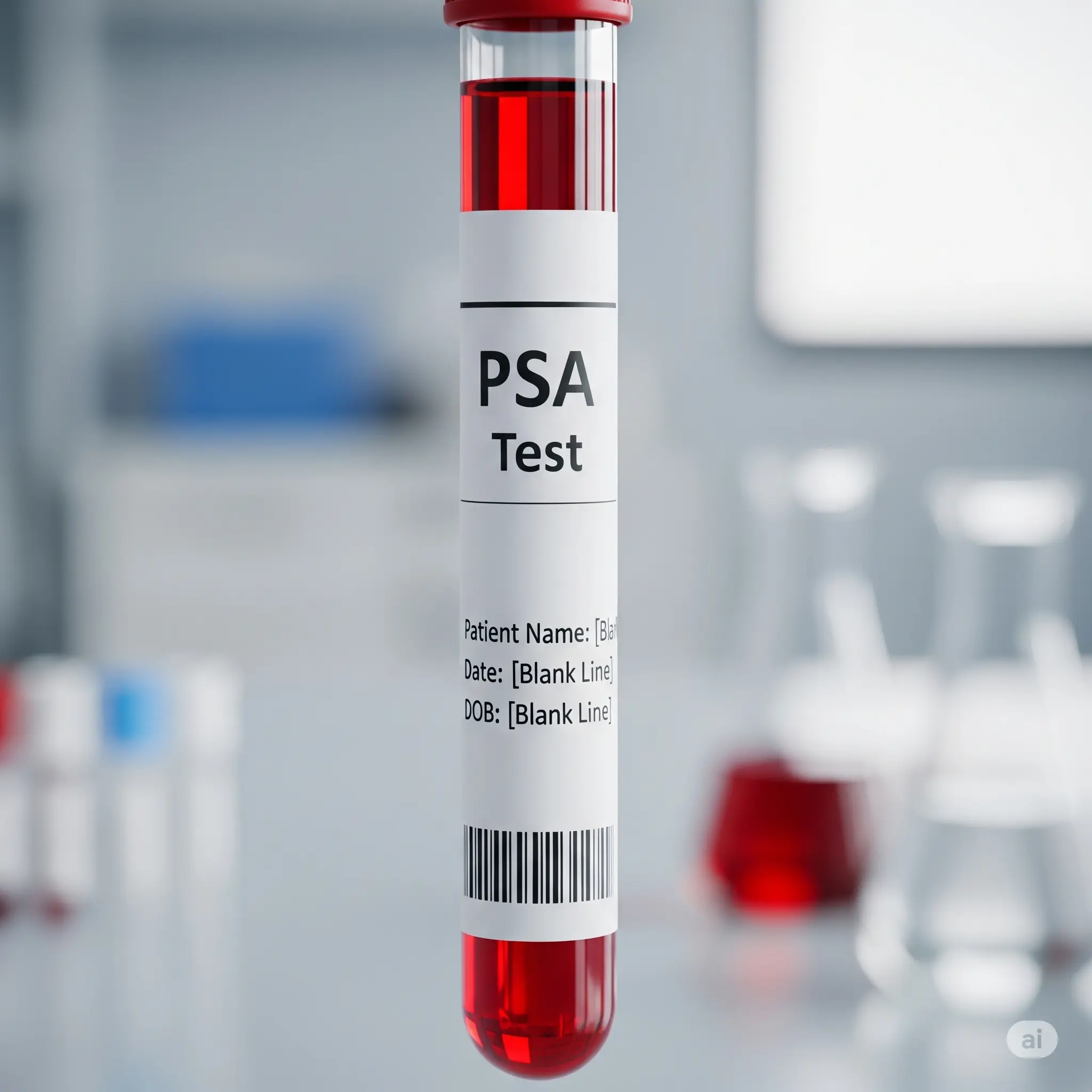
Genesiss Hospital |
Blogs

Prostate-Specific Antigen (PSA) test

Prostate Health and the Importance of PSA Testing
Men’s health is often overlooked until serious symptoms appear. Proactive screening, however, can make a crucial difference—especially for conditions like prostate cancer, one of the most common cancers affecting men.
The Prostate-Specific Antigen (PSA) test plays a key role in early detection, helping identify potential issues before symptoms develop. When combined with healthy lifestyle choices like a balanced diet, regular exercise, and routine check-ups, PSA testing is vital for maintaining prostate health.
What is a PSA Test?
The PSA test is a simple blood test that measures the level of prostate-specific antigen (PSA) in your blood. Elevated PSA levels can indicate issues such as:
- Prostate cancer
- Benign prostatic hyperplasia (BPH) or enlarged prostate
- Prostatitis (prostate inflammation)
PSA testing is generally recommended for men over 50, or earlier for those at higher risk.
Understanding PSA
PSA is a protein produced by the prostate gland. While small amounts are normal, elevated PSA levels may indicate prostate problems. Age, race, and family history influence PSA levels, making personalized evaluation essential.
Purpose of PSA Testing
PSA testing serves several important functions:
- Early Detection of Prostate Cancer: Identifies cancer in its early, most treatable stages.
- Monitoring Prostate Health: Helps track conditions like BPH or prostatitis.
- Evaluating Treatment Effectiveness: Assesses outcomes for prostate cancer treatments such as surgery, radiation, or hormone therapy.
- Detecting Recurrence: Identifies potential relapse after treatment.
Symptoms of Prostate Issues
Prostate problems can disrupt daily life. Watch out for:
- Frequent urination, especially at night
- Difficulty starting or stopping urine flow
- Weak or interrupted urine stream
- Blood in urine or semen
- Pelvic pain or discomfort
- Erectile dysfunction or pain during ejaculation
Who Should Consider PSA Testing?
PSA testing isn’t necessary for every man, but is recommended for:
- Men over 50: Prostate conditions become more common with age.
- Men with a family history of prostate cancer: Screening may start at 40–45.
- Men experiencing symptoms: Frequent urination, pelvic discomfort, or other urinary issues.
How is the PSA Test Performed?
The PSA test is a non-invasive blood test.
Preparation tips:
- Avoid ejaculation for 24–48 hours before the test.
- Refrain from vigorous physical activities like cycling.
- Inform your doctor about medications such as 5-alpha-reductase inhibitors.
Procedure:
- A blood sample is drawn from the arm.
- The sample is analyzed in a lab.
- Results are usually available in 1–3 business days.
Understanding PSA Test Results
PSA levels can vary by age and individual health:
| PSA Level (ng/mL) | Interpretation |
|---|---|
| 0–2.5 | Normal range for most men |
| 2.6–4.0 | May require further evaluation |
| 4.1–10.0 | Potentially elevated; additional testing needed |
| Above 10.0 | High risk; immediate evaluation required |
Factors that can influence PSA levels:
- Elevated: Prostate infections, recent ejaculation, vigorous exercise
- Lowered: Certain medications, low testosterone
Benefits of PSA Testing
- Early detection saves lives: Enables timely treatment.
- Non-invasive and simple: Quick blood test with minimal discomfort.
- Guides treatment plans: Helps monitor cancer treatment success and recurrence.
Risks and Limitations
- False positives/negatives: Can cause unnecessary worry or missed cases.
- Overdiagnosis/overtreatment: May lead to interventions for slow-growing cancers that may never cause harm.
PSA Test in Context
PSA vs. Other Tests:
- Digital Rectal Exam (DRE): Physical examination of the prostate.
- Imaging (MRI, Ultrasound): Used if PSA is elevated or DRE indicates irregularities.
- Biopsy: Definitive test if PSA or imaging suggests cancer.
Cost and Accessibility
PSA test costs vary depending on location, type of healthcare provider, and insurance coverage. Many insurance plans cover PSA testing for men over 50 or those at high risk. Some hospitals offer discounts or bundled health check-ups.
Conclusion
Regular PSA testing is a vital part of proactive prostate health. Early detection can save lives, reduce complications, and provide peace of mind. Max Hospital offers comprehensive PSA testing, expert consultations, and personalized care to help men take charge of their prostate health.
Book an appointment today to safeguard your health.
Frequently Asked Questions (FAQs)
What is a PSA Test?
The PSA (Prostate-Specific Antigen) test is a simple blood test that measures PSA levels in the bloodstream. It helps detect prostate problems, including prostate cancer, early before symptoms appear.
At what age should I start PSA testing?
Most men are advised to start PSA testing at age 50. Men with a family history of prostate cancer or higher risk may start earlier, around age 40–45.
Can elevated PSA levels indicate non-cancer conditions?
Yes. Elevated PSA levels can result from benign conditions such as enlarged prostate (BPH), prostatitis (inflammation), or urinary tract infections.
How often should I get a PSA test?
For average-risk men over 50, PSA testing is usually recommended every 2 years. Your doctor may adjust the frequency based on individual risk factors and previous results.
What should I do if my PSA levels are high?
If PSA levels are elevated, doctors may recommend further evaluation, including a repeat PSA test, digital rectal exam (DRE), imaging, or a prostate biopsy to determine the cause.
Is the PSA test covered by insurance?
Many insurance plans cover PSA testing, especially for men over 50 or those at higher risk. Check with your insurance provider for specific coverage details.
Where can I get a PSA test?
PSA tests are available at major hospitals and diagnostic centers, including Max Hospital branches. You can contact customer care at +91 9886777592 for appointments and details.
Need medical care?
Book your appointment with our expert doctors in just a few clicks.


When Should You Visit a Hospital Instead of a Clinic?
